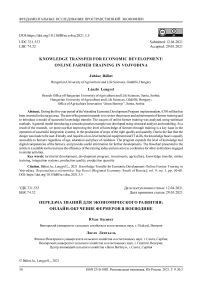Knowledge transfer for economic development: online farmer training in Vojvodina
Автор: Blint Juhsz, Lengyel Lszl
Журнал: Региональная экономика. Юг России @re-volsu
Рубрика: Фундаментальные исследования пространственной экономики
Статья в выпуске: 3 т.9, 2021 года.
Бесплатный доступ
During the five-year period of theVojvodina Economic Development Program implementation, €350 million has been invested in the target area. The aim of the present research is to review the process and achievements of farmer training and to introduce a model of successful knowledge transfer. The success of online farmer training was analyzed using statistical methods. Ageneral model introducing a concrete practice example was developed using structural analysis and modeling. As a result of the research, we point out that improving the level of knowledge of farmers through training is a key issue in the operation of successful integration systems, in the production of crops of the right qualityand quantity. Due to the fact that the design was made to be user-friendly, and requires a low-level technical equipment and IT skills, the knowledge base is equally accessible to farmers regardless of age, education and place of residence. The program expands the level of knowledge and digital competencies of the farmers, and provides useful information for further developments. The flowchart presented in the article is a suitable tool to increase the efficiencyof the training todayand can serve as a reference for other institutions engaged in similar activities.
Territorial development, development program, investments, agriculture, knowledge transfer, online training, integration systems, production quality, production quantity
Короткий адрес: https://sciup.org/149139584
IDR: 149139584 | УДК: 331.553 | DOI: 10.15688/re.volsu.2021.3.5
Текст научной статьи Knowledge transfer for economic development: online farmer training in Vojvodina
DOI:
Today, more and more measurement data and information are available in agriculture that can help you make better decisions, manage more effectively, and create sustainability. In the last decade, the agricultural sector has been completely networked with digital technologies in the areas of mechanization, soil and crop composition determination, meteorological forecasting, decision support software, and so on. It also plays a major role in training farmers, renewing and maintaining their level of knowledge. Many steps in farm management, such as the e-cadastre (e-kataszter), the digital cultivation plan, e-banking, the registration of seasonal workers, etc., have been digitized for years, so they are no strangers to the digital world and this type of communication.
The Vojvodina Economic Development Program has been now successfully implemented in Vojvodina for five years since the beginning of 2016. Based on the Regional and Economic Development Strategy of the Alliance of Vojvodina Hungarians, developed with the support of the Hungarian government, under the maintenance of the Prosperitati Foundation, an investment of around €350 million was made in the target area, with more than 14,000 projects implemented. The program is the largest foreign economic development program in the Carpathian Basin, a pioneer among similar initiatives. In addition to supporting investments and developments, it also strengthens the Hungarian community in Vojvodina by transferring knowledge. The Prosperitati Foundation offers a new unique opportunity in the field of training for agricultural society in the Carpathian Basin. In order to support the integration processes, the Prosperitati Foundation provides an e-learning service with the involvement of integrators participating in the Vojvodina Economic Development Program, and operates an online farmer training course developed by the Pro Scientia Naturae Foundation in Senta.
The concept of the online learning environment and its features are discussed by many researchers, and can be summarized as follows:
-
– learning is done using a device that can connect to the Internet;
-
– the essential element is distance: that is, neither the learning process nor its achievement is time- and place-based;
-
– supports individual learning pathways and conditions, i.e. builds heavily on self-directed learning and self-regulatory learning;
-
– the teacher or the tutor is present in the development of the learning environment and in the support of learning;
-
– can rarely be completely independent of the circumstances of offline learning [Papp-Danka, 2014].
“The technological development of the globalized world is creating fast changes in this area; due to IT innovations the actors of the educational system have to face new challenges” [Balázs, 2017]. E-learning is a form of training available on a computer network, which organizes the teachinglearning process with efficient, optimal knowledge transfer and learning methods, organizing both the curriculum and student resources, as well as tutorstudent communication and interactive computer training software into a unified framework which makes it accessible to the student [Forgó, 2005]. It is also clear from this definition that e-learning is not just a tool but a complex form of training / education that is multidisciplinary and includes the technicalities of the platform and other complementary content (videos, online tests, forums, forms, etc.) preparation and customization, joint preparation with lecturers / professionals, recording and processing of content, announcement and administration of training [Námesztovszki, 2020].
An important element of success in an online training system is how well users accept the new system and how receptive they will be to complete online trainings [Ouadahi, 2008]. However, beyond the applicable knowledge, we must not forget one of the potential disadvantages of online interfaces and inservice training: without physical presence, only through the screens of computers or mobile devices, teachers are less able to motivate students for both learning and participation. Therefore, it is extremely important to recognize learning theory and educational organization approaches that can be adaptive to online continuing education [Csedő et al., 2014].
There are different levels of e-learning:
-
1. Spontaneous level. Uploading educational content / videos to a popular site / platform. This level provides an opportunity to contact the lecturers, however, the feedback from the students is very poor and practically exhausted in tracking the number of views / openings.
-
2. Systematization of content. Uploading and systematizing educational content / videos, as well as supplementing them with various content (forums, tests, forms). Here you can observe a more intensive monitoring of students, depending on the completed tests and forms, as well as the forum activity.
-
3. Planned activity. Almost the same as the second level, but students’ activities are planned in advance and branching structures may appear, depending on the learner’s answers / choices. Today, MOOC-type courses are the most popular for organizing educational content [Námesztovszki, 2020].
Material and methods
From the completed questionnaires, the conditions necessary for the proper education of the exact target group were determined with the help of the Kárpát Agri project, as well as the methodology by which the knowledge material can be delivered to all relevant users in time and in the same quality. Once the target group, its readiness and sensitivity became clear, an examination of the Prosperitati Foundation’s integrator system began. Comprehensive development of economic environment is inconceivable without medium and large economic entities. With regard to agricultural developments, these entities are, by definition, agricultural processors. Their access to the market creates a serious demand for raw materials (primary agricultural products, crop), which means significant purchase potential for small family farms.
The supplier-partner relationship is particularly important both for the producer and the processor. The economic development program therefore aimed to develop integration systems. In addition to providing a secure purchasing market for producers and providing the right quantity and quality of goods to the processor, the integration system includes other important elements:
-
– variety definition (in order to achieve the right quality of crop, the integrator may prescribe which plant varieties are acceptable to him);
-
– providing production inputs (facilitates the start of the production year for the farmer and increases the security of processing);
-
– providing professional advice (increasing the level of knowledge of farmers contributes to the production of better quality crops);
-
– other services of mutual interest.
In building the integrator system, the next step in the program was to support small family farms, that is, to develop support to implement the developments that prepare them for successful cooperation with the integrator. By grouping processing capacities, five different integrations were defined: grains, vegetables, fruits, honey, and pigs.
One of the preconditions for real successful participation in the integration system is the availability of the appropriate agricultural machinery (this was helped by the calls for proposals), while the other precondition is the availability of the appropriate professional knowledge. In successful cooperation, it is essential to produce the right quantity and quality of crop. Improving the level of knowledge of farmers through training is a key issue in the operation of successful integration systems. As Table 1 and 2 show, a very large number of more than 3,000 farmers (who also applied for development) participate in the integration system. Under such circumstances, the implementation of classroom education faces many difficulties. An obvious and effective alternative is to organize online training.
An important aspect in the examination of the integrator system was the economic positions of the integrators, their development opportunities and goals, as well as the obligations undertaken in the tender. In addition, an important aspect was the circle of suppliers (small family farms) general preparedness. During the preparation of the program, topics related to the activities of the integrator, which are very important to the program, were identified in a personal inquiry. After gathering the needs and experiences of the integrator, the obtained information was processed into a unified structure and the training theme consisting of 23 modules was created. This topic has been sent for processing by professionals who are familiar with the Vojvodina region and provide practice-oriented, useful and up-to-date information to those interested.
Important elements in the preparation of online education, which were also covered by the program that is the subject of the present research: selection of an appropriate educational platform; preparation
Table 1
Note. Source: [Prosperitati Alapítvány, 2019].
Integrators and their projects participating in the integration system
|
# |
Applicant's name |
Total cost of the project (RSD) |
Awarded subsidies (RSD) |
Awarded subsidies (HUF) |
Subject of the tender |
|
1 |
Telek Paprika Kft. |
508,205,816.00 |
225,345,076.00 |
608,431,705.00 |
Expansion of the capacity of the plant for processing leafy herbs and paprika |
|
2 |
Gebi Kft. |
1,116,000,000.00 |
502,200,000.00 |
1,355,940,000.00 |
Construction of a sunflower processing capacity of 55,000 t / year and a storage capacity of 51,312 t + 840 t |
|
3 |
Geneza Kft. |
348,803,078.00 |
146,497,293.00 |
395,542,691.00 |
Construction of 2342 m2 of filtration and 19000 m2 of storage capacity for organic and spice processing |
|
4 |
Tisacoop Kft. |
348,720,415.90 |
156,924,187.00 |
423,695,305.00 |
Establishment and operation of honey integration in Vojvodina |
|
5 |
Kontakt Kft. |
242,874,513.00 |
109,293,531.00 |
295,092,534.00 |
Mill development: construction of 800t processing and storage capacity |
|
6 |
Andex Kft. |
1,116,000,000.00 |
502,200,000.00 |
1,355,940,000.00 |
Construction of fruit and vegetable processing, distillation capacity and 7150 t capacity cold store |
|
7 |
Aretol Ltd. |
983,246,169.70 |
442,460,776.37 |
1,194,644,096.00 |
Increasing vegetable processing and cold store capacity |
|
8 |
Császárkert kft. |
321,157,706.00 |
144,520,967.50 |
390,206,612.00 |
Establishment of a unified plant area for the production of vegetable seedlings, packaging, processing and storage of vegetables |
|
9 |
Seb-Agrar Kft. |
167,020,610.52 |
75,159,274.74 |
202,930,042.00 |
Development of storage and processing capacity for oilseed rape processing |
|
10 |
Hollo Company Kft. |
491,800,588.00 |
221,310,265.00 |
597,537,715.00 |
Pig integration and feed mixer construction |
Table 2
Projects of farmers participating in the integration system
|
Type of integration |
Approved project |
Awarded subsidy (RSD) |
Total cost of the project (RSD) |
|
Grains |
2708 |
3,354,766,099.02 |
5,230,010,336.83 |
|
Honey |
124 |
101,337,464.61 |
135,892,995.94 |
|
Pigs |
64 |
81,214,138.53 |
124,051,422.04 |
|
Fruits |
84 |
103,380,053.90 |
149,986,847.40 |
|
Vegetables |
241 |
327,326,687.50 |
500,121,987.54 |
Note. Source: [Prosperitati Alapítvány, 2019].
of digital curriculum; availability of digital devices; creation of digital curriculum schedules; development of examination forms [Proháczik, 2020].
The online platform has been chosen as the training interface, which is also a frequently used and easily adaptable, easy-to-use international system. After selecting and preparing the system and a short helping material, agricultural specialists who developed the knowledge that constituted the main element of the online training system, were involved. This was followed by the application of their written and video material to the online interface. The finished material is thus available to users in the same quality, at any time, without being tied to space. It gives the editors a useful picture of the level of knowledge, interests and thinking of farmers, which can be a very important starting point for more efficient development of further support programs.
Results
Prior to the development of the training program, a digital study of the literacy of those working in agriculture was assessed in the framework of a Carpathian Basin-level research (Kárpát Agri) and how the agricultural society can be categorized in terms of the use of digital resources. The main target group of the research was the farmers living in the Carpathian Basin, as well as the entities who are related to agricultural production in some way. The survey focused on three groups of questions built on demographic issues, management issues, issues concerning digital maturity. Due to the modular design of the questionnaire, the questions, concerning management data were filled in only by agricultural producers and employees.
The territorial delimitation of the query is limited to seven neighboring countries of Hungary, especially to the regions inhabited by Hungarians: Austria, Croatia, Romania (Transylvania), Serbia (Vojvodina), Slovakia (Highlands), Slovenia and Ukraine (Transcarpathia) (Fig. 1). The number of raw database items in the research is 795, and the number of items in the cleaned database is 781 queries. With regard to agro-IT solutions, it should be emphasized that four distinct segments can be formed:
-
a) those who do not have the IT solution in question and do not wish to use it: they cannot be considered as potential market users in the short and medium term;
-
b) those who have the given IT tool but do not use it: in-depth research is needed in this area as to what causes the equipment to be underused;
-
c) who aquired and use the specific agri-IT tool: potential users, but in their case, they can enter the market as a competition or as a new product and service innovation;
-
d) who do not have the specific agri-IT tool but would like to use it: they are the most valuable market segment.
In 2008, Oudahi conducted a survey among employees on what factors determine the acceptance
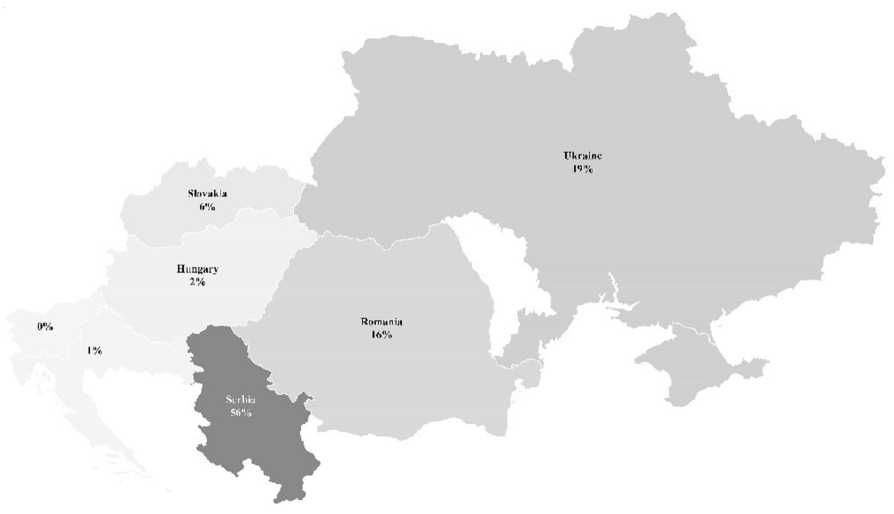
Fig. 1. Proportion of respondents by country
Note. Source: [Kárpát Agri, Discovery R&D Center, 2018].
or rejection of new IT solutions in their case. Farmers’ attitudes, acceptance of the new learning methods and application of IT solutions are the key issues in the present research too. When comparing the problem areas and digitalization as a solution, two main segments are worth mentioning: 1) those who say that the topic is not a problem and that digitization would not help; 2) those who say that the topic is a problem and digitization would help in part or to a large extent.
How often do you use the following tools to obtain information?
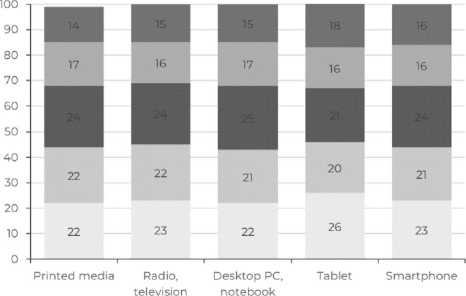
Mounthly 1-2 times ■ Once a week ■ Few t. a week ■ Daily ■ Never
Fig. 2. Frequency of use of IT tools among farmers
Note. Source: [Kárpát Agri, Discovery R&D Center, 2018].
How often do you use the resources below to get information?
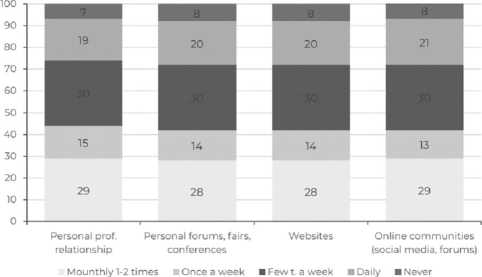
Fig. 3. Frequency of use of tools to obtain information by farmers
Note. Source: [Kárpát Agri, Discovery R&D Center, 2018].
The aim was to create a training interface and material that can be used by all beneficiaries without exception. The survey shows exactly to whom, in what way and by what means we can most effectively deliver knowledge and new information. A simple example of how digital technology is becoming an everyday thing is mobile communication, a modestly sized mobile phone, which has a significant impact on many areas of life and basic types of human activity [Benedek, 2007]. A smartphone and average mobile internet access are enough to use the online training system. Research shows that farmers, regardless of age, education and place of residence, have the necessary minimum technical knowledge and equipment.
As a result of the examination of the integration system and personal consultations, the necessary competencies have been identified, which are essential for the application of good production, practices and the implementation of agricultural production that adapts to higher quality requirements. Based on this, the topics of the professional modules were selected by experts in practical consulting, based on the questions most often asked by producers, where the most professional help should be provided, what are the current and expected problems and challenges in our area, and what was the expectation of the integrator company related to the topic and the training module. The modules that form the basis of online host training are:
-
1. Precision farming.
-
2. Food safety.
-
3. Theoretical knowledge of beekeeping.
-
4. Practical knowledge of beekeeping.
-
5. Follow-up in the food vertical.
-
6. Introduction to soil power management.
-
7. Soil power management in practice.
-
8. Irrigation.
-
9. Plant development and plant protection.
-
10. Plant protection in the field.
-
11. Horticultural plant protection.
-
12. Genetics of field crops.
-
13. Genetic background of vegetable production.
-
14. Vegetable growing in practice.
-
15. Growing sweet peppers for fresh use.
-
16. Growing sweet peppers (spice) for grounding.
-
17. Fruit growing.
-
18. Frowing of medicinal plants.
-
19. The practice of agricultural mechanization I.
-
20. The practice of agricultural mechanization II.
-
21. Innovative technologies in agricultural sectors.
-
22. Management knowledge.
-
23. Marketing knowledge.
EasyGenerator, which is a simple, easy-to-use, cloud-based and unique e-learning mechanism, was chosen as a platform for online learning. It has an interactive test system that allows you to test new types of measurement and evaluation in addition to traditional testing methods. It is used by the world’s leading companies, such as Danone, Walmart or Electrolux. In its reporting system, statements and reports can be made about the students’ study results, their knowledge and its strengths. The software is also suitable for publishing the completed course on many devices (such as mobile devices) and systems. Users can access the content through the Prosperitati Foundation’s PIT application system, which directs the user to a Moodle e-learning system that records the most important data of the entrants and guides them to the appropriate curriculum. This interface is designed to be as simple as possible so that novice users can easily access it from a mobile phone. By searching the Moodle interface, the system directs you to the EasyGenerator interface, which manages posted videos, e-books, practice assignments and final exam questions. Navigating in EasyGenerator is made easy with guides and aids in Hungarian at every step.
The training material related to the modules was prepared by 13 Hungarian and 13 Vojvodina specialists, most of them from the Hungarian or Vojvodina institution of Szent István University, but some from the Hungarian Academy of Sciences, the University of Szeged, and some independent consulting companies. The lecturers first prepared the curriculum in writing, for which the editor wrote a short introductory thought of a few seconds. The short films were recorded in a classroom in front of a white wall, in such a way that the highlighted concepts, figures, pictures, etc., could be visualized later in addition to the performer. The lecture for one module is approx. 15 minutes long and a module has an average of four smaller logic units.
The content of the lectures recorded on film was also published in an e-book, which is more detailed than the film instructional material. Following the recording, the film material underwent editing, professional and linguistic verification, and then the material that has been declared final by the editors was returned to the presenter for approval. The e-book is an edited, linguistically and professionally proofread, uniformly structured written material that carries the image elements of the program, it can be viewed from a mobile phone and a computer, and can also be downloaded and printed. The exercises that deepen the knowledge were given by the lecturers themselves, which was structured in accordance with the possibilities of EasyGenerator. After the preparation of the complete material, the final exam questions were defined jointly by the lecturer and the editor, and gave a comprehensive picture of the degree of knowledge acquired at the end of each module.
A 20–30 second video was recorded separately for each module, summarizing the topic, introducing the teacher, requirements, and so on. The video is similar to a visual table of contents, a summary. Due to system unification, all introductory videos were reported by the same person. Each module consists of four submodules based on 15– 20 minute videos and a series of evaluation questions. The advantage of this is that you do not have to look through the 60-minute curriculum at once, but the student can move step by step through topics. At the end of the module, a series of final questions were placed. A submodule consists of 1 video of 15–20 minutes. Each video contains at least 20–30% of the crop or non-studio footage. In each video, 2–4 figures, graphs and illustrations were placed, which can later be used as an exam task. Each video (submodule) has a set of evaluation questions of about 10 questions. The submodule also includes a downloadable PDF file in which the student can read what they heard in the video or revisit the figures (Fig. 4).
MAIN MODULE
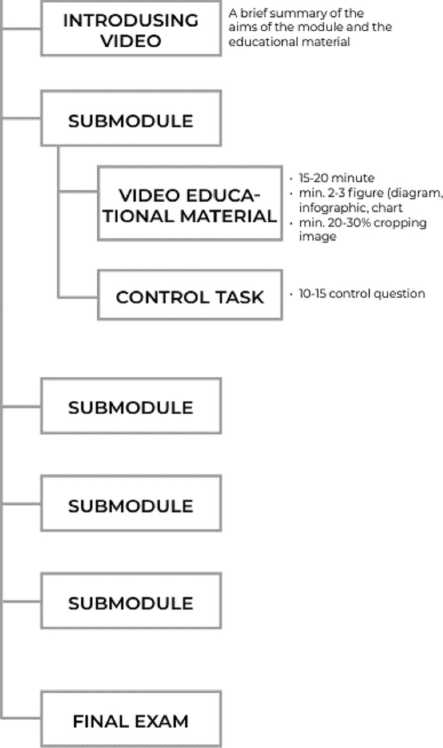
Fig. 4. Structural mapping of the online modules Note. Compiled by authors.
The following types of questions are available during the exam:
-
1. True / False. A statement must be made to be true or false.
-
2. Multiple choice (answers a, b, c, d). A statement can be associated with four answers, from which it must be decided which is true.
-
3. Image-specific response selection. You must tell which image is correct for an image or figure.
-
4. Complete. Parts of a text are left blank and are filled in by the student.
-
5. Add text based on answers provided. Certain items in a text that the student can select from a drop-down menu have been omitted.
-
6. Collapse. Sentence parts can be connected to each other.
-
7. Arrange. A text / sentence must be arranged in a logical order
-
8. “Hot spots”. Certain elements must be marked on an image or map.
Going through the program, the user can immediately see the success of the completion, in case of an unsuccessful attempt, he can resume the training, but he can also review the films or the written material several times as required. The completion of the course (module) is registered by EasyGenerator in such a way that we can track almost all attempts, clicks, mistakes and successes of the user, so we can get an idea of which are the most popular learning materials, where are the most common mistakes and where they may not understand the explanations.
A total of 3,160 farmers were able to use the online farmer training program, 703 of whom completed at least one module, and 53 farmers successfully completed all courses (see Fig. 5).
Based on the interest of the users, in order to make the acquired knowledge as widely applicable and usable as possible, the training has been accredited in accordance with Serbian legal requirements. The accredited courses cover several modules and are accepted in the following structure:
-
1. State-recognized approved training – Field and horticultural plant protection (3 modules).
-
2. Approved trainings:
-
a) Theory and practice of beekeeping (2 modules);
-
b) Soil and water management (3 modules);
-
c) Agricultural mechanization practice and precision agriculture (3 modules);
-
d) Agricultural crop production (7 modules).
In the first cycle, 383 farmers from 23 villages of Vojvodina applied for the accredited training. The most massive applications were from the villages along Bácska and the Tisza, but the farmers of the settlements of Banat also joined the training in large numbers. Almost all ages were represented, with the youngest participant being 19 years old and the oldest being 83 years old.
A total of 383 farmers (students) took part in the training, completing 883 trainings, while 299 students successfully entered and completed 676 trainings. Based on this, 227 participants obtained state-recognized official certificates and in addition, another 449 certificates will be awarded to the participants of the other four training programs. The efficiency recorded in the first training cycle is 76.55% (see Table 3).
Conclusions
The economic development program supervised and carried out by the Prosperitati Foundation contributes not only to the support of investments and developments, but also to the development and prosperity of the Hungarian community in Vojvodina by creating a knowledge base and exploring the potential of knowledge transfer.
The program offers a new opportunity for the local society in the field of trainings, and represents a unique opportunity in the Carpathian Basin.
Due to the fact that the design was made to be user-friendly, and requires a low-level technical equipment and IT skills, the knowledge base is equally accessible to farmers regardless of age, education and place of residence.
The program simultaneously expands the level of knowledge and digital competencies of the farmers, and provides useful information for further developments.
Soil power management in practice
Precision farming
Irrigation
Follow-up in the food vertical
Plant protection in the field
Plant development and plant protection
Management knowledge
Practical know ledge of beekeeping
Theoretical know ledge of beekeeping
Marketing knowledge
Horticultural plant protection
Innovative technologies in agricultural sectors
Fruit growing
Growing of medicinal plants
Growing sweet peppers (spice) for grounding
Grow ing sweet peppers for fresh use
Food safety
Introduction to soil power management
Vegetable growing in practice
Genetic background of vegetable production
Genetics of field crops
Presentation of online course
The practice of agricultural mechanization 11.
The practice of agricultural mechanization 1.
User achievement ■ Uscr check in
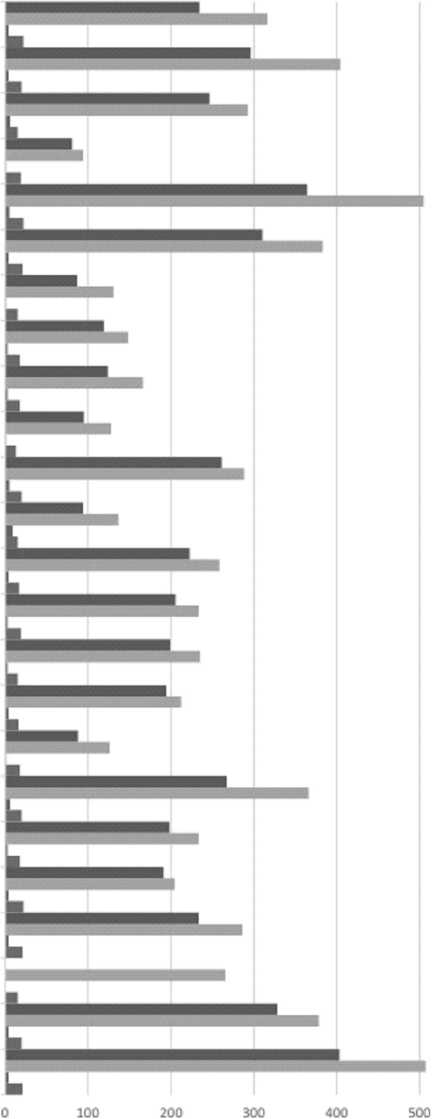
Village farmer consultant achievement ■ Village farmer consultant check in
Fig. 5. Number of farmers who completed the training per module Note. Compiled by authors.
Participants in accredited training
Table 3
|
Accredited training |
Number of applicants |
Number of successful completion |
|
Field and horticultural plant protection |
269 |
227 |
|
Agricultural mechanization practice and precision agriculture |
205 |
152 |
|
Agricultural crop production |
204 |
135 |
|
Theory and practice of beekeeping |
49 |
37 |
|
Soil and water management |
156 |
125 |
Note. Source: [Pro Scientia Naturae Alapítvány, 2020].
Список литературы Knowledge transfer for economic development: online farmer training in Vojvodina
- Balázs P., 2017. Online Educational Environments and ICT Tools in Higher Education: Teacher Survey. Andragoške studije, pp. 145-181. DOI: 10.5937/andstud1701145P.
- Benedek A., 2007. Tanulás és tudás a digitális korban. Magyar tudomány. 1159 p. URL: http://epa.oszk.hu/00600/00691/00045/pdf/1159-1162.pdf (accessed 6 March 2021).
- Csedő Z., Tóth T., Égler A., Sára Z., 2014. Onlineképzésistratégiák és módszerek a közszolgálati továbbképzésekben. Információs Társadalom, vol. 1, pp. 9-28. URL: http://epa.hu/01900/01963/00043/pdf/EPA01963_informacios_tarsadalom_2014_1_009-028.pdf (accessed 6 March 2021).
- Forgó S., 2005. Az e-learning fogalma. HUTTER Ottó – MAGYAR Gábor - MLINARICS József: E-LEARNING 2005 (e- learning kézikönyv). Budapest, Műszaki Könyvkiadó, pp. 13-20.
- Kárpát Agri, Discovery R&D Center, 2018. Piackutatás a Kárpát-medence digitális mezőgazdasági fejlődés trendjeiről, lehetőségeiről. URL: https://karpatagri.hu/wp-content/uploads/2020/11/K%C3 %A1r p%C3 %A1t-Agr i-Piacku tat%C3%A1s.pdf (accessed 11 November 2020).
- Námesztovszki Zs., 2020. Sikeres online kurzusok elkészítésének módszertani különlegességei. URL: https://webuni.hu/kepzes/vallalkozasi-ismeretek (accessed 11 November 2020).
- Ouadahi J., 2008. A Qualitative Analysis of Factors Associated with User Acceptance and Rejection of a New Workplace Information System in the Public Sector: A Conceptual Model. Canadian Journal of Administrative Sciences, vol. 15, no. 3, pp. 201-213. DOI: 10.1002/cjas.65.
- Papp-Danka A., 2014. Az online tanulási környezettel támogatott oktatási formák tanulásmódszertanának vizsgálata. Budapest, ELTE Eötvös Kiadу, pp. 5-156. URL: http://www.eltereader.hu/media/2015/01/Papp_Danka_A_Online_tanulasi_READER.pdf (accessed 17 April 2021).
- Proháczik Á., 2020. A tantermi és online oktatás összehasonlító elemzése. Opus et Educatio, no. 7 (3), pp. 208-2019. DOI: http://dx.doi.org/10.3311/ope.390.
- Prosperitati Alapítvány, 2019. URL: https://www.prosper itati.rs/palyazati-eredmenyek (accessed 17 April 2021).
- Pro Scientia Naturae Alapítvány, 2020. URL: https://proscnat.tanuljkertesz.hu (accessed 17 April 2021).

